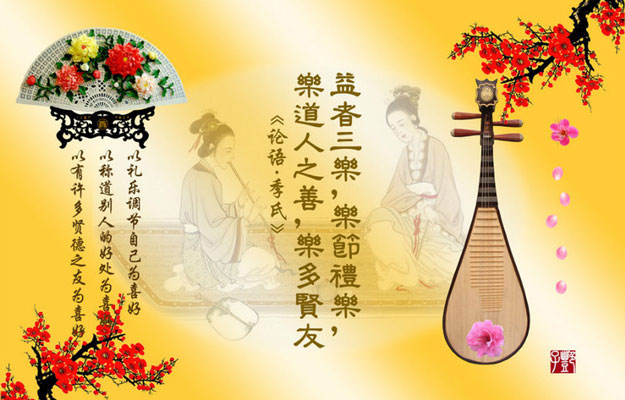16.2 On enjoyment
孔子曰、益者三樂、損者三樂、樂節禮樂、 樂道人之善、樂多賢友、益矣。樂驕樂、樂佚遊、樂宴樂、損矣。
Confucius said, ‘There are three things men find enjoyment in which are advantageous, and three things they find enjoyment in which are injurious. To find enjoyment in the discriminating study of ceremonies and music; to find enjoyment in speaking of the goodness of others; to find enjoyment in having many worthy friends:– these are advantageous. To find enjoyment in extravagant pleasures; to find enjoyment in idleness and sauntering; to find enjoyment in the pleasures of feasting:– these are injurious.’
* * *
There are some who perceive Confucianism as a “dry” and lifeless tradition with blank faces and rigid lifestyle. This is another chapter that refutes this perception (refer also to Section 6.1 – 3 Levels of Practice) as Confucius himself described enjoyments in life. He did not object joy and enjoyment, he merely recommended proper enjoyments: 1) traditional music, ceremonies, and manners; 2) praising goodness in others; and 3) making wise friends, and avoid non-healthy enjoyments: 1) prideful recklessness; 2) aimless loitering; and 3) extravagant partying.
The former 3 enjoyments strengthen and uplift one self and others, versus indulgence of the latter 3 could lead to addiction and confusion. Do you have joy in your life? If so, where do you find it?
16.2 益者三樂、損者三樂
孔子曰、益者三樂、損者三樂、樂節禮樂、 樂道人之善、樂多賢友、益矣。樂驕樂、樂佚遊、樂宴樂、損矣。
* * *
有一些想法認為,儒家思想是“乾”的,毫無生氣的,是木納的面孔和僵化的傳統生活方式。這一章再次反駁了這種看法(參見第6.1章 – 修行3階段)。孔子本人不反對快樂和享受,他只建議健康和恰當的享受:1)傳統音樂,儀式和禮節; 2)稱讚別人的優點,和3)結交賢明的朋友;以及避免不健康的享受:1)驕傲放肆的樂趣; 2)漫無目的的遊蕩; 3)奢侈荒淫的宴會。
前三種享受能加強和提升自我和他人,而放縱後三種享受會導致上癮,混亂和沉淪。你的人生快樂嗎?你在哪裡找到快樂?


Leave a Reply